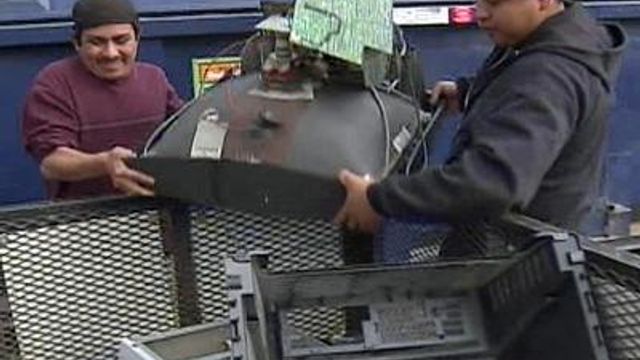Planning to dump your analog TV? Please, recycle
With the digital TV transition coming, a lot of people are updating their TVs and tossing out the old ones. However, putting TVs in the landfill presents a toxic risk, and you can try to recycle.
Posted — UpdatedBy law, on Feb. 17, full-power television stations nationwide will stop using analog, which is what TV has used since it was invented, and begin broadcasting exclusively in a digital format. Viewers who get their television signals over-the-air, via an antenna, will lose their picture if their TV is not digital-ready.
Jim Carlisle didn't want his old TV, so he brought it to the North Wake Landfill, but for recycling instead of burying.
"It's very convenient,” Carlisle said.
From the landfill, the TV is sent to Synergy Recycling, north of Greensboro.
Workers take the televisions apart piece by piece. Materials are sold to companies who reuse them. The supply is steady.
Synergy gets "probably 3,000 to 5,000 a month, maybe more,” Clayton said.
However, the recycling effort isn't statewide. Johnston, Lee, Harnett, Person, Wilson, Nash, Edgecombe, Sampson, Granville, Vance, Hoke, Moore, Halifax, Wayne and Warren counties don't have TV-recycling programs. It can cost local governments as much as $5 per TV to recycle, and that money is tough to come by during these strained economic times.
"Actually, we lose money on every TV we touch,” even with being paid to take them, Clayton said. The company recycles other materials as well, however.
Despite the cost, interest in TV recycling is growing.
“Every year, we see another two to three counties doing this,” said Scott Mouw, with the North Carolina Department of Environment and Natural Resources.
The DTV transition could change that even more. No one knows how many people will suddenly find themselves with outdated TVs.
"If we find in February or March that everybody wants to throw away their TV that day, then we've got a problem on our hands,” Mouw said.
Mouw says money from a disposal waste tax could help start up more electronics recycling programs. The state is also trying to get TV manufacturers to help out with the cost.
"I wish for all the stuff that you had to get rid of, you could find a proper place to dispose of it rather than just the landfill site,” recycler Cathy Williamson said.
Wake, Durham, Orange, Franklin and Chatham counties recycle TVs. Cumberland County accepts certain TVs for recycling.
Orange County has been recycling TVs for more than four years. The county presorts some materials before sending them to the contractor to be recycled. That cuts down on the cost, according to Rob Taylor, recycling waste manager for Orange County.
"We have found that our electronics recycling program, pound for pound, is one of the cheapest recycling programs that we run," Taylor said.
Orange County hasn't seen an increase in drop-offs, but Wake County is seeing about 100 times more than last year.
“We think that because we've (Orange County) accepted TVs for several years already, there isn't as much of a demand in our community to get rid of old televisions (now)," Taylor said.
Orange County has one of the highest per capita electronic recycling rates in the state.
If you live in a county without a TV recycling program, you can contact your manufacturer. Some TV manufacturers have recycling programs, while others will pay counties to recycle for them.
• Credits
Copyright 2024 by Capitol Broadcasting Company. All rights reserved. This material may not be published, broadcast, rewritten or redistributed.





